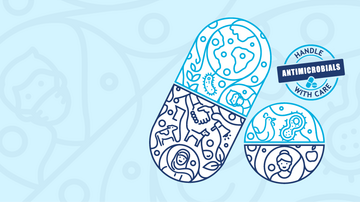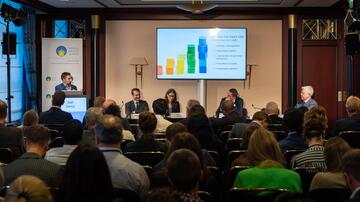Call for action by the German Network against Antimicrobial Resistance (DNAMR)
On the occasion of the AMR Awareness Week, the DNAMR is urgently calling for the introduction of market incentives to promote the development of antibiotics.
"We are heading towards a crisis with our eyes wide open. Soon we will lack the antibiotics we need to perform vital operations," says Dr Timo Jäger, Managing Director of the German Center for Infection Research (DZIF) and spokesperson for the German Network against Antimicrobial Resistance (DNAMR). To address the urgency of joint action, the DNAMR has issued a "Call for Action" to the relevant stakeholders in the ministries and the Bundestag.
The six recommendations for immediate action are:
- Introduction of effective market incentives for the development of new, resistance-breaking antibiotics as quickly as possible
Even if resistance-breaking reserve antibiotics are to be used only when the standard treatment of an infection is no longer effective due to resistance, their development, production and provision must be economically viable for investors. In the long run, the costs of such market incentive systems—so called pull mechanisms—are significantly lower than the costs of an antibiotic shortage to health systems and society. One market incentive mechanism that can be implemented in the EU is the "transferable exclusivity extension", which enables the necessary additional sales with other medicines.
- Reimbursement for the use of reserve antibiotics in hospitals
Until now, the use of reserve antibiotics in hospitals has been insufficiently regulated. As only the cost of standard antibiotics is reimbursed, hospitals may feel compelled not to use the expensive reserve antibiotics for treatment, even though this would be therapeutically necessary.
- Introduction of bridge financing for micro, small and medium-sized enterprises (SMEs) currently active in antibiotic development
The currently very limited development pipeline of reserve antibiotics consists almost exclusively of projects driven by small and micro enterprises. These should be supported financially to ensure their economic survival and thus the funding of the projects until a market mechanism is established.
- Active political dialogue with all parties involved in the research and development of new antibiotics
The DNAMR is constantly seeking dialogue with the responsible ministries and politicians, but progress is slow. An EU decision on the introduction of a market incentive mechanism will not be taken for several years. However, the political will to act on the one hand, and the sensible design of a market incentive mechanism on the other, will be needed to ensure that it is actually effective and that more companies get involved in the development of new antibiotics.
- Continuing efforts to promote research
Germany is already making important contributions in the area of research funding, for example by providing financial support for research activities. The DNAMR is committed to ensuring that Germany emphasises the need to promote basic research to the EU Commission, other EU Member States and beyond, and to encourage other countries to become more involved.
- Appointment of a national commissioner for antimicrobial resistance, as in the UK and Sweden
The appointment of a person to oversee and promote all necessary measures to solve the problem would be a good and important signal to all those involved that the urgency of the task has also been recognised in Germany and that all necessary measures are now being taken to tackle it.
The DNAMR hopes that this "Call for Action" will shake up politics. The aim is to combine research funding (push) with market incentives (pull) and to strengthen basic and clinical research as well as drug development.
Please find the full text of the "Call for Action" with additional information here (German only). We would be delighted if you also recognise the urgency of the situation and report on it.
If you have any further questions or interview requests, please contact the DNAMR by email.
Members of the DNAMR
The DNAMR is a voluntary association of organisations, institutions, companies, legal entities and individuals who are committed to the development of new, resistance-breaking antibiotics. Representatives come from the BEAM Alliance (Biotech Companies from Europe innovating Anti-Microbial resistance research), the German Center for Infection Research (DZIF), the Global AMR R&D Hub, the German Society of Infectious Diseases (DGI), the Paul-Ehrlich-Society for Infection Therapy (PEG), the Association of Research-Based Pharmaceutical Companies (vfa) and the Center for Sepsis Control and Care at the University Hospital of Jena.
https://dnamr.de/ (German only)




